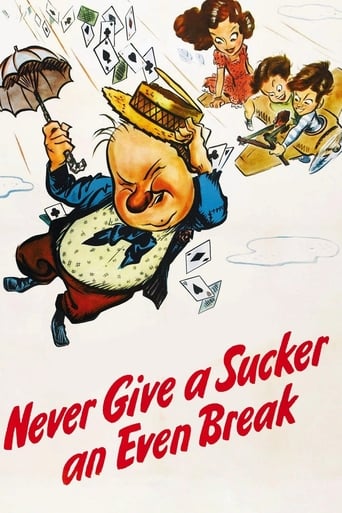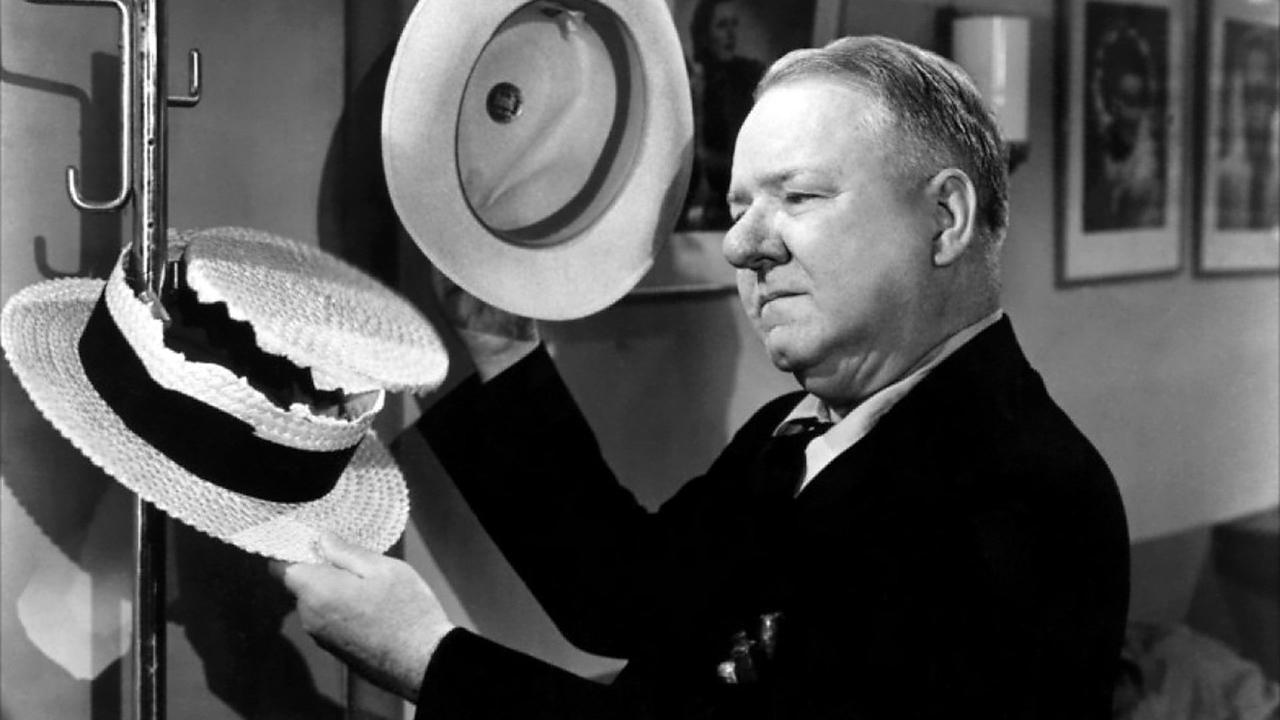museumofdave
Imagine handing a studio executive a script in which your hero falls out of the open window of an airplane while chasing a whiskey bottle and lands atop a mountain where Mrs. Hemoglobin lives with her daughter (who has never seen a man) and her pet gorilla...this is part of a script which Fields hands to Director Franklin Pangborn in the film (and which we see enacted) and the same script Fields himself wrote under the pseudonym of Otis Criblecoblis.If zany, off-the-wall, slightly surreal humor appeals to you (mixed with some irrelevant musical numbers from Gloria Jean that Universal probably forced Fields to include as part of his financing bargain), this cinematic oddity may be your ideal afternoon of fun--half the best lines are half-thrown away by Fields, so it pays to listen closely and enjoy The Great Man towards the end of his career, unfettered by convention and often very funny. No one has ever approached the distinctive comic style of this off-the-wall social critic, and with political correctness guiding most studio fare, it is doubtful that anyone will.
bobc-5
The movie centers around W. C. Fields, playing a fictional version of himself, trying to pitch a script at Esoteric Studios. The purpose is presumably to provide a vehicle for Fields' young star-in-the-making niece, but it's actually an absurd story which features Fields himself. As we watch the film within the film, we're occasionally interrupted by producer Franklin Pangborn (an actor also using his real name here) telling us just how ridiculous the movie we're watching is.With some nice behind-the-scenes shots and a completely irreverent attitude, this movie clearly had the potential to be a wonderful satire of the film industry, but it would've required much better dialog and a younger W. C. Fields to make that happen. Although it's a nice touch to have Pangborn telling us in the film itself just how bad the film is, there is nothing particularly insightful or witty about his remarks, nor is there any indication of satirical intent in the many clichéd and overworked gags seen throughout the film. The fact that there is no real effort to connect the final chase sequence to the plot is no doubt seen by many as part of this movie's charm, but there was no framework created which would let me see that as a positive. As far as Fields himself goes, it's hard to believe that only one year passed between making the "Bank Dick" and this film; he seems to have aged at least a decade. The Fields magic is missing through most of the movie, leaving him looking clumsy and tired.In spite of these flaws, the movie is nevertheless a fun way to spend an hour and fifteen minutes. Many of the more absurd scenes are quite memorable, my favorite being Fields diving off the open-air observation deck of a luxury airplane in flight so as to retrieve a liquor bottle which fell from the railing. Some of the gags hit their mark, completely unexpected things keep popping up, and occasionally Fields is able to place himself in a situation where he can at least come close to conjuring up the mannerisms and expressions which made him such a brilliant comic actor in the past. The final sequence may have nothing to do with the rest of the film, but it's still an outstanding comic chase scene. To sum it up, this is an entertaining and somewhat memorable film which moves briskly from start to finish, but it's unfortunately not a particularly good one.
MARIO GAUCI
I watched this one first from the second of Universal's W.C. Fields Box Set because of its almost legendary status for being "completely insane", as Leonard Maltin so aptly puts it; incidentally, the film also turned out to be The Great Man's last starring vehicle (based on his own story, credited to Otis Criblecoblis). It's amazing how Fields' essentially unlikable personality has endured over the years: he's the only actor who has made a career out of constantly dwelling on his vices, i.e. the "golden nectar", and pet hates (especially children). Besides, his comic style is so personal as to be incoherent at times - but that's part of his genius: who else could come up with such a bizarre line as "How'd you like to hide the egg and gurgitate a few saucers of mocha java?" and make it sound so utterly hilarious through his unique delivery? While self-references such as abound in this film weren't uncommon in the old Hollywood, not to mention its anything-goes attitude revolving around a wisp of plot - think Universal's own HELLZAPOPPIN' (1942), for instance, with Olsen & Johnson - Fields was the only one among the great comedians who was willing to experiment in this way; in fact, some of the cast members (including the star) play themselves and, at one point, Fields is even seen admiring the poster of his latest success THE BANK DICK (1940) while two boys exclaim to one another what a bummer it was! The end result is perhaps patchy overall but often uproarious nonetheless: there are too many pauses for song - though Gloria Jean herself is pretty and charming, and the jive rendition of "Comin Thru' The Rye" by a girl who has been sheltered from the world all her life is an inspired touch. Among Fields' comic foils in the film are Franklin Pangborn (as a flustered studio head), Marx Bros. regular Margaret Dumont (playing the grande dame even in her mountaintop retreat) and Leon Errol (as Fields' rival for the hand of wealthy man-hating Dumont). Incidentally, the receptionist in Pangborn's office is played by Carlotta Monti - Fields' then-companion.The film's best scenes and gags include: the diner sequence with Fields exchanging insults with a heavy-set waitress; the disruption of Gloria's rehearsal of a musical number, over which Pangborn presides, by the set construction crew; Pangborn reading Fields' surreal script (in which, among other things, he dives off an aeroplane - whose interior and rear deck resemble those of a train's - after the gin bottle he accidentally drops, and again from a parapet when Dumont suggests that they kiss!); Dumont's fanged mastiff (an equally fake-looking gorilla also turns up here); and, of course, the classic and brilliantly-sustained chase finale (which was later lifted for the Abbott & Costello vehicle IN SOCIETY [1944]). The dialogue is equally great - including one of the star's best-remembered lines: "I was in love with a beautiful blonde once: she drove me to drink - that's the one thing I'm indebted to her for"; he even throws in a dig at the censor, when a scene that was supposed to take place in a bar had to be reset to a soda fountain! P.S. At the end, Gloria leaves with Fields and he tells her that he had promised her mother he would take care of the girl; the mother, a trapeze artist, appears at the beginning of the film but her death scene (to which this brief exchange refers) was subsequently deleted.By the way, I'm again baffled by the fact that I've yet to come across any online review for this wonderful set; also, I'm personally not bothered by the Collection's relatively high price-point - considering that we're getting, at least, 4 comedic gems (besides, by having only one film per disc, we don't risk the freezing issues which plagued Universal's Abbott & Costello Franchise releases and which have so far kept me from purchasing them).
Karl Emanuel
Without doubt, "Never Give a Sucker an Even Break" is Fields at his absolute best. The "plotline" is so completely beyond belief that it provides the nearly perfect vehicle for Fields' unique and irreverent style with its constant stream of sight gags and one-liners. His mumbled verbal interactions with Madame Hemoglobin (Margaret Dumont) and the "tiny waitress" in the café (Jody Gilbert) are as memorably irreverent as anything he had done previously and are worth listening to closely to fully appreciate. The constantly changing scenes and situations in this film provide ample opportunity for his verbal and visual "charms" to be fully utilized, and in my opinion this is his finest and most consistently funny effort. If you haven't seen this film, give it a viewing or two. If you are a true Fields fan, you'll enjoy it as much as or more so than any of his other more well-known offerings.


 AD
AD





